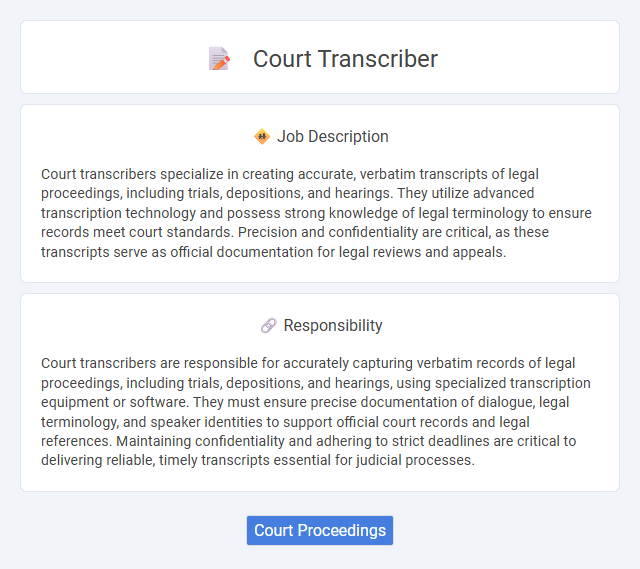
Court transcribers specialize in creating accurate, verbatim transcripts of legal proceedings, including trials, depositions, and hearings. They utilize advanced transcription technology and possess strong knowledge of legal terminology to ensure records meet court standards. Precision and confidentiality are critical, as these transcripts serve as official documentation for legal reviews and appeals.
Individuals with strong attention to detail and excellent listening skills have a high probability of thriving as court transcribers. Those who can maintain focus during lengthy proceedings and accurately capture spoken words may be well-suited for this role. Conversely, people who struggle with concentration or fast typing might find the demands of this job challenging.
Qualification
Court transcribers require exceptional typing speed and accuracy, often mandated to exceed 225 words per minute with minimal errors. Proficiency in legal terminology and adherence to transcription protocols are essential for producing precise, verbatim records. Certifications such as the Certified Legal Transcriptionist (CLT) or Registered Professional Reporter (RPR) enhance credibility and employment prospects in the courtroom transcription field.
Responsibility
Court transcribers are responsible for accurately capturing verbatim records of legal proceedings, including trials, depositions, and hearings, using specialized transcription equipment or software. They must ensure precise documentation of dialogue, legal terminology, and speaker identities to support official court records and legal references. Maintaining confidentiality and adhering to strict deadlines are critical to delivering reliable, timely transcripts essential for judicial processes.
Benefit
Court transcribers likely benefit from steady employment due to consistent demand in legal settings. The role probably offers opportunities for skill development in specialized legal terminology and transcription technology. It may also provide a flexible work environment, including options for remote or freelance positions.
Challenge
Court transcribers face the challenge of accurately capturing rapid speech and legal terminology under high-pressure conditions. The likelihood of encountering unclear audio or overlapping dialogue increases the difficulty of producing precise transcripts. Mastering specialized vocabulary and maintaining exceptional attention to detail are probable necessities for success in this demanding role.
Career Advancement
Court transcribers develop specialized skills in legal terminology and audio transcription, positioning themselves for advancement into senior transcriptionist roles or legal documentation specialists. Mastery of court reporting software and accuracy in real-time transcription can lead to opportunities in judicial administration or paralegal fields. Continuous professional development and certification enhance prospects for supervisory positions or consultancy roles within the legal sector.
Key Terms
Court Proceedings
Court transcribers specialize in capturing verbatim transcripts of court proceedings, ensuring precise and accurate documentation of trials, hearings, and depositions. Their expertise in legal terminology and sound recognition allows them to produce reliable records critical for appeals and legal reviews. Maintaining confidentiality and adhering to strict formatting standards are essential components of their role in supporting the judicial process.
 kuljobs.com
kuljobs.com